| Listing 1 - 7 of 7 |
Sort by
|
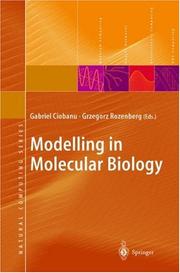
ISBN: 3540407995 Year: 2004 Publisher: Berlin Springer
Abstract | Keywords | Export | Availability | Bookmark
 Loading...
Loading...Choose an application
- Reference Manager
- EndNote
- RefWorks (Direct export to RefWorks)
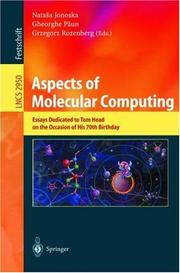
ISBN: 3540207813 9786610306664 1280306661 3540246355 9783540207818 Year: 2004 Volume: 2950 Publisher: Berlin, Heidelberg : Springer Berlin Heidelberg : Imprint: Springer,
Abstract | Keywords | Export | Availability | Bookmark
 Loading...
Loading...Choose an application
- Reference Manager
- EndNote
- RefWorks (Direct export to RefWorks)
Molecular computing is a rapidly growing subarea of natural computing. On the one hand, molecular computing is concerned with the use of bio-molecules for the purpose of actual computations while, on the other hand, it attempts to understand the computational nature of molecular processes going on in living cells. The book presents a unique and authorative state-of-the-art survey on current research in molecular computing: 30 papers by leading researchers in the area are drawn together on the occasion of the 70th birthday of Tom Head, a pioneer in molecular computing. Among the topics addressed are molecular tiling, DNA self-assembly, splicing systems, DNA-based cryptography, DNA word design, gene assembly, and membrane computing.
Molecular computers --- Molecular computers. --- Basic Sciences. Mathematics --- Mathematical Models, Simulation Models. --- DNA-based computers --- DNA computers --- Mathematics. --- Computer science. --- Mathematical logic. --- Mathematical Logic and Foundations. --- Computer Science, general. --- Algebra of logic --- Logic, Universal --- Mathematical logic --- Symbolic and mathematical logic --- Symbolic logic --- Mathematics --- Algebra, Abstract --- Metamathematics --- Set theory --- Syllogism --- Informatics --- Science --- Math --- Biocomputers --- Natural computation --- Logic, Symbolic and mathematical.
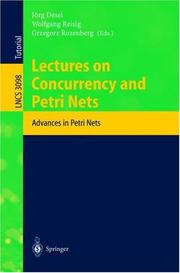
ISSN: 03029743 ISBN: 3540222618 9783540222613 3540277552 Year: 2004 Volume: 3098 Publisher: Berlin Springer
Abstract | Keywords | Export | Availability | Bookmark
 Loading...
Loading...Choose an application
- Reference Manager
- EndNote
- RefWorks (Direct export to RefWorks)
Petri nets --- Machine theory --- Parallel processing (Electronic computers) --- Computer science --- Information systems --- Computer architecture. Operating systems --- Mathematics. --- Computer communication systems. --- Computers. --- Algorithms. --- Computer logic. --- Information storage and retrieval. --- Mathematical logic. --- Mathematical Logic and Foundations. --- Computation by Abstract Devices. --- Algorithm Analysis and Problem Complexity. --- Logics and Meanings of Programs. --- Computer Communication Networks. --- Information Storage and Retrieval. --- Algebra of logic --- Logic, Universal --- Mathematical logic --- Symbolic and mathematical logic --- Symbolic logic --- Mathematics --- Algebra, Abstract --- Metamathematics --- Set theory --- Syllogism --- Computer science logic --- Logic, Symbolic and mathematical --- Algorism --- Algebra --- Arithmetic --- Automatic computers --- Automatic data processors --- Computer hardware --- Computing machines (Computers) --- Electronic brains --- Electronic calculating-machines --- Electronic computers --- Hardware, Computer --- Computer systems --- Cybernetics --- Calculators --- Cyberspace --- Communication systems, Computer --- Computer communication systems --- Data networks, Computer --- ECNs (Electronic communication networks) --- Electronic communication networks --- Networks, Computer --- Teleprocessing networks --- Data transmission systems --- Digital communications --- Electronic systems --- Information networks --- Telecommunication --- Cyberinfrastructure --- Electronic data processing --- Network computers --- Math --- Science --- Foundations --- Distributed processing --- Logic, Symbolic and mathematical. --- Computer science. --- Computer software. --- Logic design. --- Information storage and retrieva. --- Design, Logic --- Design of logic systems --- Digital electronics --- Electronic circuit design --- Logic circuits --- Switching theory --- Software, Computer --- Informatics --- Information storage and retrieval systems. --- Automatic data storage --- Automatic information retrieval --- Automation in documentation --- Computer-based information systems --- Data processing systems --- Data storage and retrieval systems --- Discovery systems, Information --- Information discovery systems --- Information processing systems --- Information retrieval systems --- Machine data storage and retrieval --- Mechanized information storage and retrieval systems --- Electronic information resources --- Data libraries --- Digital libraries --- Information organization --- Information retrieval --- Petri nets - Congresses --- Machine theory - Congresses --- Parallel processing (Electronic computers) - Congresses
Book
ISBN: 9812562494 9789812562494 Year: 2004 Publisher: [River Edge] New Jersey World Scientific
Abstract | Keywords | Export | Availability | Bookmark
 Loading...
Loading...Choose an application
- Reference Manager
- EndNote
- RefWorks (Direct export to RefWorks)
This book is based on columns and tutorials published in the Bulletin of the European Association for Theoretical Computer Science (EATCS) during the period 2000-2003. It presents many of the most active current research lines in theoretical computer science. The material appears in two volumes, "Algorithms and Complexity" and "Formal Models and Semantics", reflecting the traditional division of the field. The list of contributors includes many of the well-known researchers in theoretical computer science. Most of the articles are reader-friendly and do not presuppose much knowledge o

ISBN: 3540223932 9783540223931 3540278125 Year: 2004 Volume: 3113 Publisher: Berlin, Heidelberg : Springer Berlin Heidelberg : Imprint: Springer,
Abstract | Keywords | Export | Availability | Bookmark
 Loading...
Loading...Choose an application
- Reference Manager
- EndNote
- RefWorks (Direct export to RefWorks)
Computer Science --- Computer science --- Machine theory --- Mathematics --- Computer mathematics --- Computer science. --- Computers. --- Computer logic. --- Mathematical logic. --- Numerical analysis. --- Computer Science. --- Theory of Computation. --- Computation by Abstract Devices. --- Logics and Meanings of Programs. --- Mathematical Logic and Formal Languages. --- Discrete Mathematics in Computer Science. --- Numeric Computing. --- Mathematics. --- Machine theory. --- Discrete mathematics --- Electronic data processing --- Informatics --- Science --- Abstract automata --- Abstract machines --- Automata --- Mathematical machine theory --- Algorithms --- Logic, Symbolic and mathematical --- Recursive functions --- Robotics --- Information theory. --- Logic design. --- Computational complexity. --- Electronic data processing. --- ADP (Data processing) --- Automatic data processing --- Data processing --- EDP (Data processing) --- IDP (Data processing) --- Integrated data processing --- Computers --- Office practice --- Complexity, Computational --- Design, Logic --- Design of logic systems --- Digital electronics --- Electronic circuit design --- Logic circuits --- Switching theory --- Communication theory --- Communication --- Cybernetics --- Automation --- Computer science—Mathematics. --- Mathematical analysis --- Algebra of logic --- Logic, Universal --- Mathematical logic --- Symbolic and mathematical logic --- Symbolic logic --- Algebra, Abstract --- Metamathematics --- Set theory --- Syllogism --- Computer science logic --- Automatic computers --- Automatic data processors --- Computer hardware --- Computing machines (Computers) --- Electronic brains --- Electronic calculating-machines --- Electronic computers --- Hardware, Computer --- Computer systems --- Calculators --- Cyberspace --- Computer science - Mathematics
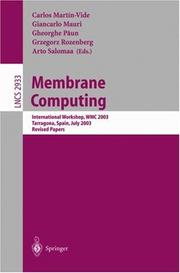

ISBN: 1280307986 9786610307982 3540246193 354020895X Year: 2004 Publisher: Berlin, Heidelberg : Springer Berlin Heidelberg : Imprint: Springer,
Abstract | Keywords | Export | Availability | Bookmark
 Loading...
Loading...Choose an application
- Reference Manager
- EndNote
- RefWorks (Direct export to RefWorks)
This volume is based on papers presented at the Workshop on Membrane Computing, WMC 2003, which took place in Tarragona, Spain, in the - riod July 17–July 22, 2003. This was the Fourth Annual Membrane Computing Workshop, and the ?rst one held outside Romania. The ?rst three meetings were organized in Curtea de Arge¸ s, Romania – they took place in August 2000 (with the proceedings published in Lecture Notes in Computer Science, Vol. 2235), in August 2001 (with a selection of papers published as a special issue of F- damenta Informaticae, Vol. 49, Nos. 1–3, 2002), and in August 2002 (with the proceedings published in Lecture Notes in Computer Science, Vol. 2597). The 2003 workshop was the second workshop of the Molecular Computing Network (MolCoNet) funded by the EU Commission in the Fifth Framework Program Information Society Technologies (project number IST–2001–32008). The preproceedings of WMC 2003 were published as Technical Report 28/03 of theResearchGrouponMathematicalLinguisticsfromRoviraiVirgiliUniversity, Tarragona, and they were available during the workshop.
Computer science. --- Computer simulation. --- Bioinformatics. --- Computer Science. --- Computation by Abstract Devices. --- Mathematical Logic and Formal Languages. --- Simulation and Modeling. --- Molecular computers --- Computer Science --- Engineering & Applied Sciences --- Mathematics. --- Computers. --- Mathematical logic. --- Mathematical Logic and Foundations. --- Theory of Computation. --- Logic, Symbolic and mathematical. --- Information theory. --- Bio-informatics --- Biological informatics --- Biology --- Information science --- Computational biology --- Systems biology --- Computer modeling --- Computer models --- Modeling, Computer --- Models, Computer --- Simulation, Computer --- Electromechanical analogies --- Mathematical models --- Simulation methods --- Model-integrated computing --- Informatics --- Science --- Communication theory --- Communication --- Cybernetics --- Algebra of logic --- Logic, Universal --- Mathematical logic --- Symbolic and mathematical logic --- Symbolic logic --- Mathematics --- Algebra, Abstract --- Metamathematics --- Set theory --- Syllogism --- Data processing --- Automatic computers --- Automatic data processors --- Computer hardware --- Computing machines (Computers) --- Electronic brains --- Electronic calculating-machines --- Electronic computers --- Hardware, Computer --- Computer systems --- Machine theory --- Calculators --- Cyberspace
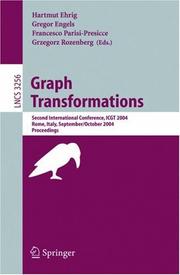
ISBN: 3540232079 3540302034 9783540232070 Year: 2004 Volume: 3256 Publisher: Berlin, Heidelberg : Springer Berlin Heidelberg : Imprint: Springer,
Abstract | Keywords | Export | Availability | Bookmark
 Loading...
Loading...Choose an application
- Reference Manager
- EndNote
- RefWorks (Direct export to RefWorks)
ICGT 2004 was the 2nd International Conference on Graph Transformation, following the first one in Barcelona (2002), and a series of six international workshops on graph grammars with applications in computer science between 1978 and 1998. ICGT 2004 was held in Rome (Italy), Sept. 29–Oct. 1, 2004 under the auspices of the European Association for Theoretical Computer Science (EATCS), the European Association of Software Science and Technology (EASST), and the IFIP WG 1.3, Foundations of Systems Specification. The scope of the conference concerned graphical structures of various kinds (like graphs, diagrams, visual sentences and others) that are useful when describing complex structures and systems in a direct and intuitive way. These structures are often augmented with formalisms that add to the static description a further dimension, allowing for the modelling of the evolution of systems via all kinds of transformations of such graphical structures. The field of graph transformation is concerned with the theory, applications, and implementation issues of such formalisms. The theory is strongly related to areas such as graph theory and graph algorithms, formal language and parsing theory, the theory of concurrent and distributed systems, formal specification and verification, logic, and semantics. The application areas include all those fields of computer science, information processing,engineering,and the natural sciences where static and dynamic m- elling using graphical structures and graph transformations, respectively, play important roles. In many of these areas tools based on graph transformation technology have been implemented and used.
Graph grammars --- Computer science --- Congresses --- Data Structures. --- Computation by Abstract Devices. --- Grammars, Graph --- Mathematics. --- Software engineering. --- Data structures (Computer science). --- Computers. --- Algorithms. --- Discrete mathematics. --- Discrete Mathematics. --- Mathematics, general. --- Software Engineering. --- Algorithm Analysis and Problem Complexity. --- Formal languages --- Graph theory --- Data structures (Computer scienc. --- Computer science. --- Computer software. --- Informatics --- Science --- Computer software engineering --- Engineering --- Math --- Software, Computer --- Computer systems --- Algorism --- Algebra --- Arithmetic --- Automatic computers --- Automatic data processors --- Computer hardware --- Computing machines (Computers) --- Electronic brains --- Electronic calculating-machines --- Electronic computers --- Hardware, Computer --- Cybernetics --- Machine theory --- Calculators --- Cyberspace --- Discrete mathematical structures --- Mathematical structures, Discrete --- Structures, Discrete mathematical --- Numerical analysis --- Information structures (Computer science) --- Structures, Data (Computer science) --- Structures, Information (Computer science) --- Electronic data processing --- File organization (Computer science) --- Abstract data types (Computer science) --- Foundations --- Graph grammars - Congresses --- Computer science - Congresses
| Listing 1 - 7 of 7 |
Sort by
|

 Search
Search Feedback
Feedback About UniCat
About UniCat  Help
Help News
News